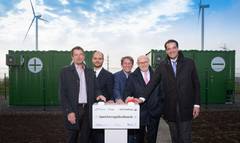A new lithium-ion battery energy storage facility connected to a wind farm in northern Germany has started operations as part of a research programme.
The BESS, connected to the Curslack wind farm, comprises 24 second life batteries originating from BMW electric vehicles.
The facility provides 720 kilowatts of output and 792 kilowatt-hours of storage capacity and is integrated with five wind turbines to “enable practical research to be conducted into the possibilities for the system integration of renewable energies”.
Energy group Vattenfall built the facility in conjunction with the Competence Centre for Renewable Energies and Energy Efficiency (CCREE) of the Hamburg University of Applied Sciences, and the Nordex Group.
The construction partners have also indicated their intention to “jointly design models or innovative system services”. They will develop and test control algorithms and parameters for applications such as the local provision of reactive power or instantaneous reserves.
The facility has been built as part of the Norddeutsche EnergieWende (North German Energy Transition) 4.0 project (NEW 4.0), which aims to “realise a sustainable energy supply and thus strengthen the sustainability of [North Germany].”
“The integration of a battery storage system in our own wind farm and the links with the neighbouring CCREE energy campus provide a unique constellation for our research projects on the energy system of the future,” said Dr Werner Beba, CCREE head and project coordinator.












